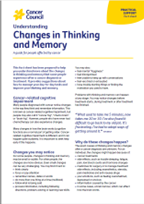- Home
- Breast cancer
- Managing side effects
- Thinking and memory changes
Thinking and memory changes
Some people with breast cancer notice changes in how they think and remember information. This is called cancer-related cognitive impairment, or referred to as “chemo brain”, “cancer fog” or “brain fog”.
Learn more about:
- What causes thinking and memory changes?
- Coping with thinking and memory changes
- Ways to cope with these changes
What causes thinking and memory changes?
The exact cause is unknown, but studies suggest these changes may be caused by the cancer, emotions such as anxiety and depression, cancer treatments (not just chemotherapy), anaesthetic given for surgery, and side effects such as fatigue, insomnia, pain and hormone changes.
For more on this see Changes in thinking and memory and listen to our podcast on Brain Fog and Cancer.
Coping with thinking and memory changes
For most people, thinking and memory problems get better within the first year of finishing treatment. Others may have long-term effects. If you have severe or lasting changes to your thinking and memory skills, you can see a clinical psychologist or neuropsychologist for cognitive rehabilitation. Speak to your health care team about the services available at your hospital or from a psychologist.
Ways to cope with these changes
- Adjust your daily routine, e.g. write lists, keep a diary, use smartphone reminders or alarms, pace yourself and avoid distractions
- Try not to multitask. Instead focus on one thing at a time
- Do the most demanding tasks at the time of day when your energy levels are best
- Maintain a healthy lifestyle, e.g. exercise, relax, eat healthy foods, get enough rest and sleep
- Improve your thinking and memory, e.g. crosswords, puzzles, brain training
- Tell your family, friends, and health care team about any changes and ask for help.
→ READ MORE: Breast prosthesis
Podcast: Brain Fog and Cancer
Listen to more episodes from our podcast for people affected by cancer
More resources
A/Prof Elisabeth Elder, Specialist Breast Surgeon, Westmead Breast Cancer Institute and The University of Sydney, NSW; Collette Butler, Clinical Nurse Consultant and McGrath Breast Care Nurse, Cancer Support Centre, Launceston, TAS; Tania Cercone, Consumer; Kate Cox, 13 11 20 Consultant, Cancer Council SA; Dr Marcus Dreosti, Radiation Oncologist and Medical Director, GenesisCare, SA; Dr Susan Fraser, Breast Physician, Cairns Hospital and Marlin Coast Surgery Cairns, QLD; Dr Hilda High, Genetic Oncologist, Sydney Cancer Genetics, NSW; Prof David W Kissane AC, Chair of Palliative Medicine Research, The University of Notre Dame Australia, and St Vincent’s Hospital Sydney, NSW; Prof Sherene Loi, Medical Oncologist, Peter MacCallum Cancer Centre, VIC; Dr W Kevin Patterson, Medical Oncologist, Adelaide Oncology and Haematology, SA; Angela Thomas, Consumer; Iwa Yeung, Physiotherapist, Princess Alexandra Hospital, QLD.
View the Cancer Council NSW editorial policy.
View all publications or call 13 11 20 for free printed copies.



